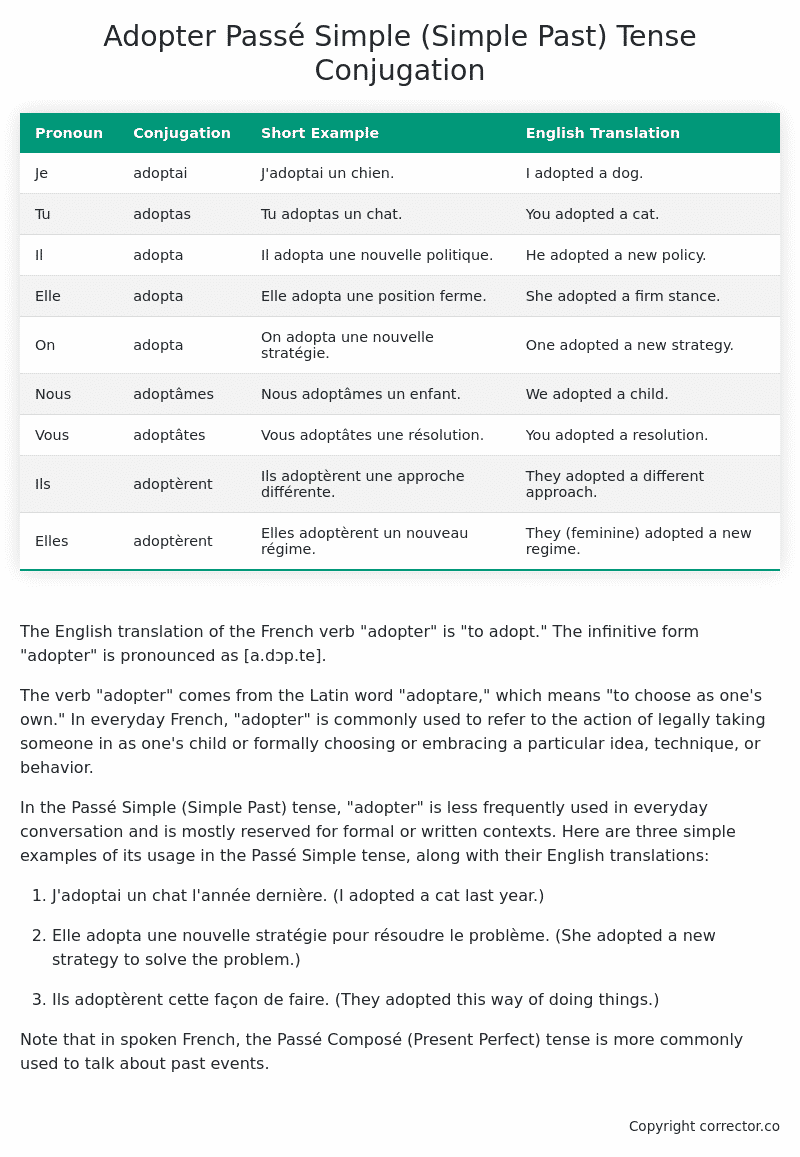Passé Simple (Simple Past) Tense Conjugation of the French Verb adopter
Introduction to the verb adopter
The English translation of the French verb “adopter” is “to adopt.” The infinitive form “adopter” is pronounced as [a.dɔp.te].
The verb “adopter” comes from the Latin word “adoptare,” which means “to choose as one’s own.” In everyday French, “adopter” is commonly used to refer to the action of legally taking someone in as one’s child or formally choosing or embracing a particular idea, technique, or behavior.
In the Passé Simple (Simple Past) tense, “adopter” is less frequently used in everyday conversation and is mostly reserved for formal or written contexts. Here are three simple examples of its usage in the Passé Simple tense, along with their English translations:
-
J’adoptai un chat l’année dernière.
(I adopted a cat last year.) -
Elle adopta une nouvelle stratégie pour résoudre le problème.
(She adopted a new strategy to solve the problem.) -
Ils adoptèrent cette façon de faire.
(They adopted this way of doing things.)
Note that in spoken French, the Passé Composé (Present Perfect) tense is more commonly used to talk about past events.
Table of the Passé Simple (Simple Past) Tense Conjugation of adopter
| Pronoun | Conjugation | Short Example | English Translation |
|---|---|---|---|
| Je | adoptai | J’adoptai un chien. | I adopted a dog. |
| Tu | adoptas | Tu adoptas un chat. | You adopted a cat. |
| Il | adopta | Il adopta une nouvelle politique. | He adopted a new policy. |
| Elle | adopta | Elle adopta une position ferme. | She adopted a firm stance. |
| On | adopta | On adopta une nouvelle stratégie. | One adopted a new strategy. |
| Nous | adoptâmes | Nous adoptâmes un enfant. | We adopted a child. |
| Vous | adoptâtes | Vous adoptâtes une résolution. | You adopted a resolution. |
| Ils | adoptèrent | Ils adoptèrent une approche différente. | They adopted a different approach. |
| Elles | adoptèrent | Elles adoptèrent un nouveau régime. | They (feminine) adopted a new regime. |
Other Conjugations for Adopter.
Le Present (Present Tense) Conjugation of the French Verb adopter
Imparfait (Imperfect) Tense Conjugation of the French Verb adopter
Passé Simple (Simple Past) Tense Conjugation of the French Verb adopter (You’re reading it right now!)
Passé Composé (Present Perfect) Tense Conjugation of the French Verb adopter
Futur Simple (Simple Future) Tense Conjugation of the French Verb adopter
Futur Proche (Near Future) Tense Conjugation of the French Verb adopter
Plus-que-parfait (Pluperfect) Tense Conjugation of the French Verb adopter
Passé Antérieur (Past Anterior) Tense Conjugation of the French Verb adopter
Futur Antérieur (Future Anterior) Tense Conjugation of the French Verb adopter
Subjonctif Présent (Subjunctive Present) Tense Conjugation of the French Verb adopter
Subjonctif Passé (Subjunctive Past) Tense Conjugation of the French Verb adopter
Subjonctif Imparfait (Subjunctive Imperfect) Tense Conjugation of the French Verb adopter
Subjonctif Plus-que-parfait (Subjunctive Pluperfect) Tense Conjugation of the French Verb adopter
Conditionnel Présent (Conditional Present) Tense Conjugation of the French Verb adopter
Conditionnel Passé (Conditional Past) Tense Conjugation of the French Verb adopter
Conditionnel Passé II (Conditional Past II) Tense Conjugation of the French Verb adopter
L’impératif Présent (Imperative Present) Tense Conjugation of the French Verb adopter
L’impératif Passé (Imperative Past) Tense Conjugation of the French Verb adopter
L’infinitif Présent (Infinitive Present) Tense Conjugation of the French Verb adopter
L’infinitif Passé (Infinitive Past) Tense Conjugation of the French Verb adopter
Le Participe Présent (Present Participle) Tense Conjugation of the French Verb adopter
Le Participe Passé (Past Participle) Tense Conjugation of the French Verb adopter
Struggling with French verbs or the language in general? Why not use our free French Grammar Checker – no registration required!
Get a FREE Download Study Sheet of this Conjugation 🔥
Simply right click the image below, click “save image” and get your free reference for the adopter Passé Simple tense conjugation!

Adopter – About the French Passé Simple (Simple Past) Tense
Formation
Usage
Narration
Historical Context
Interactions with other tenses
Passé Composé
Imparfait
Conditional and Subjunctive
Summary
I hope you enjoyed this article on the verb adopter. Still in a learning mood? Check out another TOTALLY random French verb conjugation!


